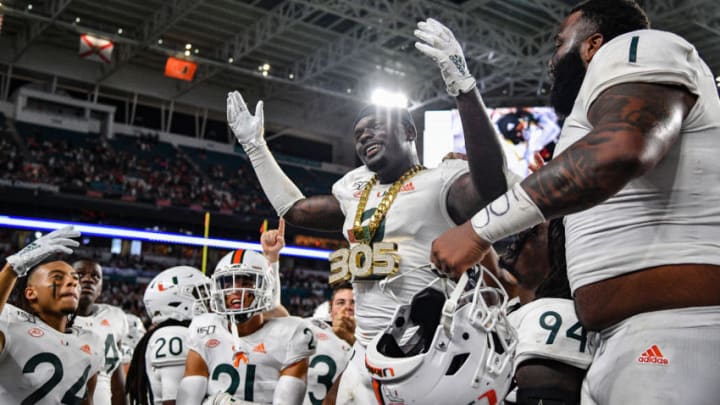The Miami football team is ranked 37th in the recently released Football Power Index. Based on the metrics used to determine that number and who Miami lost versus who is returning for 2020 the Hurricanes are ranked fairly.
The Miami football program is ranked 37th in the ESPN Football Power Index entering the 2020 season as recently released by the network. The ranking is fair based on who is returning to the Hurricanes in 2020 and who has moved on. The Football Power Index was developed by ESPN to measure the strength of a team.
Miami is 97th in returning production from 2019 according to the ESPN Metrics guru Bill Connolly. In some respects that number could be considered low based on the additions Miami has made through the transfer portal with quarterback D’Eriq King, kicker Jose Borreagales and defensive end Quincy Roche.
All three are moving up from Group of Five programs to Miami and the ACC. It is always tough to project how a player will perform moving up what most perceive to be a higher level of football. King and Borregales are expected to be exceptional upgrades at QB and kicker. Roche should add to an already fierce pass rush.
According to Connolly, Miami returns 55 percent of its production overall, 59 percent on offense to rank 82nd and 50 percent on defense to rank 106th. No program in FBS was able to add players ready to step in and make an impact as much as King and Roche should for Miami. The remainder of the roster has to improve.
ACC teams in the ESPN Preseason FPI rankings:
— Josh Parcell (@JoshParcell) February 18, 2020
1 Clemson
18 UNC
23 Florida State
25 Virginia Tech
35 Louisville
37 Miami
43 Pittsburgh
47 UVA
55 Georgia Tech
59 NC State
64 Duke
69 Wake Forest
72 Syracuse
78 Boston College
The offensive line for Miami in 2019 was nearly historically bad. Everyone returns upfront. The Hurricanes need improvement from the offensive line or the addition of King and hiring of new offensive coordinator Rhett Lashlee will be minimized. Clemson, North Carolina, Florida State and Virginia Tech have ranked ahead of Miami.
Florida State is 27th in returning production in 2020. They return 73 percent overall, 63 percent on offense to rank 69th and 83 percent of their defensive production to rank ninth. Those numbers can often be misleading depending on a variety of factors. The Seminoles have been mediocre the past three seasons.
The preseason FPI are completely predictive and tough to project. It’s entirely based on data from the previous season without truly knowing how a team will perform during the upcoming season. Miami will start a new QB, is bringing in a new offensive coordinator and Manny Diaz is in his second season. ESPN explained the FPI.
"“Each team’s FPI rating is composed of a predicted offensive, defensive and special teams component. These ratings represent the number of points each unit is expected to contribute to the team’s net scoring margin on a neutral field against an average FBS opponent.In the preseason, these components are made up entirely of data from previous seasons, such as returning starters, past performance, recruiting rankings and coaching tenure.”"
The offseason has created a lot of excitement for the Miami football program. The numbers in the FPI judged as misleading with the changes Miami has made during the offseason. Those numbers cannot translate until the Miami football team proves they have improved on the field in 2020.
